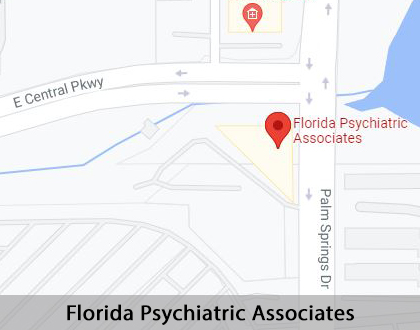Psychoanalytic Therapy Altamonte Springs, FL
Many people benefit from psychoanalytic therapy. This form of psychotherapy focuses on how the unconscious mind affects one's feelings, thoughts, and behaviors. By doing so, patients can better understand why they act the way they do — and how to change their behavior accordingly.
Florida Psychiatric Associates does not provide psychoanalytic therapy. However, it is available in the surrounding area.
Understanding Psychoanalytic Therapy
Psychoanalytic therapy is a form of psychotherapy based on Sigmund Freud's of psychoanalysis. It centers on the unconscious mind and how one's past and experiences may contribute to their present actions. According to psychoanalysis, every one of us possesses and is influenced by unconscious thoughts, desires, memories, and feelings.
Becoming aware of these factors may bring the patient to catharsis, help them gain insight from their current state of mind, and find relief from psychological distress. Additionally, psychoanalysis suggests that personality development is heavily influenced by early childhood events and that the personality is largely developed by the time one reaches age five.
History of Psychoanalytic Therapy
According to Freud, the human mind was composed of three main elements: the id, the ego, and the superego. He based many of his observations and theories on both clinical cases and case studies. While this made his findings difficult to generalize to the larger population, his theories had a lasting impact on how society thinks about the human mind and behavior.
However, he is not the only theorist associated with psychoanalytic therapy. For example, as stated by VeryWell Health, Erik Erikson expanded on many of Freud's theories, emphasizing the importance of growth throughout the lifespan. Today, psychoanalysis consists of applied psychoanalysis, neuro-psychoanalysis, and psychoanalytic theory.
“According to psychoanalysis, every one of us possesses and is influenced by unconscious thoughts, desires, memories, and feelings.”
How Psychoanalytic Therapy Works
Since psychoanalysis is based on the belief that past experiences and the unconscious mind primarily drive everyone, psychoanalytic therapy focuses on uncovering these hidden motivators. Patients may meet with their psychoanalyst at least once a week for months or even years.
Techniques Used in Psychoanalytic Therapy
Several popular techniques of psychoanalytic therapy include dream interpretation, free association, Freudian slip, and transference. Freud considered dream analysis to be the most important psychoanalytic technique, often referring to it as the "royal road to the unconscious."
Free association is when the patient freely shares their thoughts in response to words or images from the psychoanalyst. It is not uncommon for repressed memories to emerge during this process. Freudian slips, also known as parapraxis, are a phenomenon where the patient says one thing while meaning another. Finally, transference occurs when one projects their feelings about another onto the psychoanalyst. This helps the psychoanalyst understand how the patient interacts with others.
“Since psychoanalysis is based on the belief that past experiences and the unconscious mind primarily drive everyone, psychoanalytic therapy focuses on uncovering these hidden motivators.”
Types of Psychoanalytic Therapy
Today, there are two main types of psychoanalytic therapy: applied psychoanalysis and neuro-psychoanalysis. Applied psychoanalysis applies psychoanalytic principles not only to real-world settings and situations but also to the study of art and literature. In contrast, neuro-psychoanalysis applies neuroscience to psychoanalytic issues. These may include dreams and repression.
Applied Psychoanalysis
In the words of the American Psychoanalytic Association (APSAA), applied psychoanalysis applies psychoanalytic theories and methods to "explain social, cultural and political phenomena and has been going on since psychoanalysis began." In other words, they use psychoanalytic principles to make sense of the world.
Neuro-Psychoanalysis
Thanks to modern scientific advances, we can now understand the link between neuroscience and psychoanalytic models of the human mind better than ever before. By marrying these domains, neuro-psychoanalysis exemplifies the ways in which how the mind is organized can "inform and enrich brain exploration — and vice versa."
“Today, there are two main types of psychoanalytic therapy: applied psychoanalysis and neuro-psychoanalysis.”
Check out what others are saying about our mental wellness on Yelp: Psychoanalytic Therapy in Altamonte Springs, FL
Candidates for Psychoanalytic Therapy
Psychoanalytic therapy can benefit virtually anybody looking for more insight into their behavior and thought patterns. However, patients must be active participants in their treatment, willing to potentially confront past traumas and introspect.
Additionally, it is important to know the difference between medication and psychoanalysis. Psychoanalytic therapy is a form of talk therapy that involves talking through issues to better understand them and discover more effective techniques for managing them. In contrast, medication, usually prescribed by a psychiatrist, can help treat the patient through trying to correct an imbalance of chemicals in the brain that are causing the patient turmoil.
“Psychoanalytic therapy can benefit virtually anybody looking for more insight into their behavior and thought patterns.”
Questions Answered on This Page
Q. What is psychoanalytic therapy?
Q. What are some of the techniques used in psychoanalytic therapy?
Q. What are the two main types of psychoanalysis?
Q. Am I a good candidate for psychoanalytic therapy?
Q. What are some reasons someone should seek psychoanalytic therapy?
People Also Ask
Benefits of Psychoanalytic Therapy
According to the American Psychological Association, in a review of the literature comparing psychoanalytic approaches to cognitive-behavioral therapy (CBT) , there are seven distinguishing features of psychoanalytic therapy. This includes the (1) focus on emotion, (2) exploration of avoidance, (3) identification of recurring themes, (4) orientation towards experience, (5) exploration of interpersonal relationships, (6) emphasis of the therapeutic relationship, and (7) its free-flowing nature.
In other words, unlike CBT, psychoanalytic therapy allows patients to explore their full range of emotions, including anything they may find distressing and want to avoid. This also helps identify recurring self-destructive patterns of behavior, however unconscious they may be. Additionally, whereas other forms of psychotherapy focus on the present, psychoanalytic therapy allows for a more complete picture of how one's past may affect both their present and future. This also allows patients to better explore their current and past relations with others. Since the therapeutic relationship is so important in this form of psychotherapy and patients are encouraged to explore freely, they may speak of fears, desires, and dreams that have previously gone unheard.
When to Seek Psychoanalytic Therapy
Psychoanalytic therapy can benefit anyone dealing with mental health problems, such as anxiety or depression. Individuals with personality traits that keep getting in the way of either their private or professional lives are also likely to respond to psychoanalytic therapy. In any case, it is important to remember that problems do not necessarily have to be severe to seek the help of a psychoanalyst.
According to the APSA, "being worried, having long-standing internal conflicts, or even just curious about yourself and how your mind works, are valid reasons for speaking with a psychoanalyst." Gaining insight into one's self and one's behaviors can help one confront various roadblocks in one's life path.
“Psychoanalytic therapy can benefit anyone dealing with mental health problems, such as anxiety or depression.”
Frequently Asked Questions
Q. How long does psychoanalytic therapy take?
A. While most psychoanalytic therapy sessions have a definite ending and beginning, there is no pre-set time for patients to resolve their longstanding difficulties. Most patients find it useful to think in terms of years, as it may take some time to resolve any deeply entrenched inner conflicts. Therapy involves enhancing the patient's capacity for self-analysis.
Q. Do psychoanalysts talk with their patients?
A. Psychoanalysts talk with their patients to help offer an idea, a potential connection bringing a patient's past experience into meaningful focus, or a note of feeling. However, they also prioritize silence as a means of allowing patients' thoughts to emerge freely.
Q. How are psychoanalysts trained?
A. Psychoanalysts typically graduate as a psychologist or psychiatrist and must be trained at a training institute monitored by the International Psychoanalytical Association (IPA). They then have to complete a learning and training process lasting anywhere from five to 10 years, completing a deep, personal analysis, clinical training under a senior analyst's supervision, and a theoretical course given by other analysts.
Q. When is psychoanalytic therapy completed?
A. This is a complicated question to answer. How much time it takes to complete varies by patient. Psychoanalytic therapy can generally be considered complete when the patient is ready to fully experience and take accountability for their feelings rather than rely upon defense mechanisms.
Q. What can I expect during the first appointment?
A. The first few sessions are typically meant for the psychoanalyst to get to know the patient and understand the nature of their problem. As such, you should expect to answer a few questions regarding your issue. The psychoanalyst may also make relevant comments and ask for any necessary clarification. It is normal to spend the first few appointments assessing the nature of the patient's problem and addressing the most urgent concerns first.
Change Is Possible – Call Us Today
Life isn’t always easy. Are you struggling? Are you looking for a highly personalized and professional approach tailored to your individual needs? Instead of waiting around, call us today. You should know that there is hope for a better tomorrow.
Definitions
Call Us Today
If you are dealing with mental health issues or are looking for more insight into your patterns of behavior, psychoanalytic therapy may be the answer. We at Florida Psychiatric Associates can help. Call us today at 407-960-5633 to schedule an appointment or learn more about our services.
Helpful Related Links
- American Psychiatric Association (APA). Mental Health Topics. 2021
About our business, license, and website security
- Florida Psychiatric Associates was established in 2003.
- We accept the following payment methods: American Express, Cash, Discover, MasterCard, and Visa
- We serve patients from the following counties: Seminole County, Volusia County and Orange County
- We serve patients from the following cities: Altamonte Springs, Lake Mary, Sanford, Deltona, Orange City, DeBary, Apopka, Maitland, Winter Park and Orlando
- FL (License #ME68974). View License Information and Specifics
- National Provider Identifier Database (1518910835). View NPI Registry Information
- Norton Safe Web. View Details
- Trend Micro Site Safety Center. View Details
Back to top of Psychoanalytic Therapy







